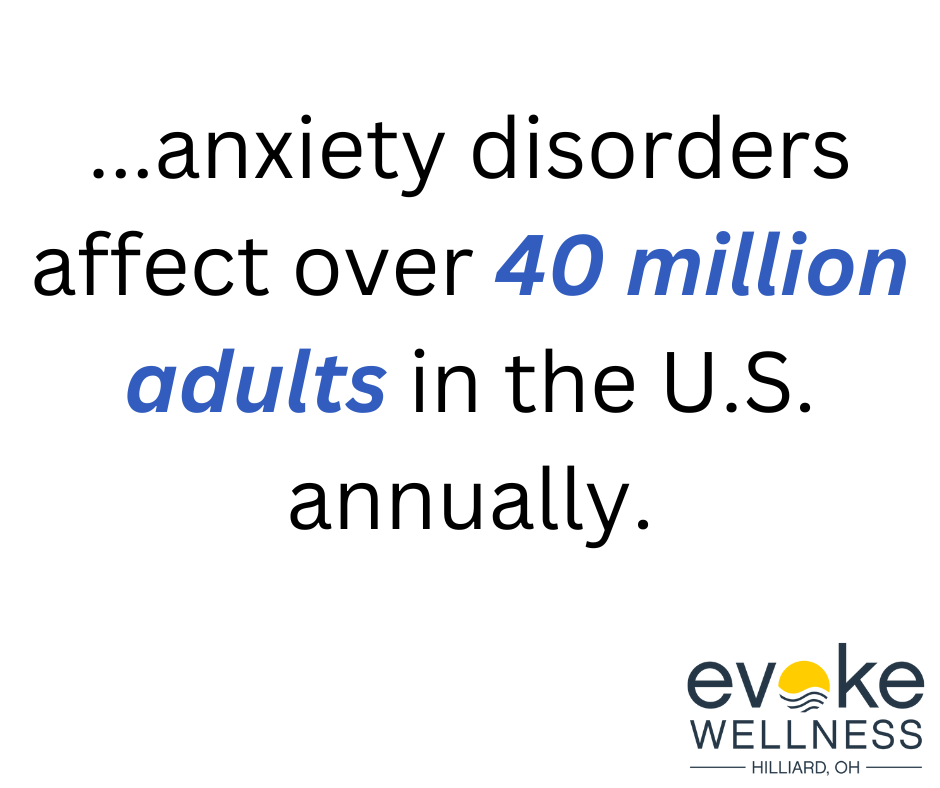Are you one of the millions struggling with anxiety? You’re not alone. Recent statistics show that anxiety disorders affect 40 million adults in the United States each year. But there’s hope on the horizon. Mental health treatment has come a long way, with groundbreaking therapies and medications offering new paths to recovery. In this article, we’ll explore:
- Cutting-edge anxiety treatments
- How to find the right mental health professional
- Lifestyle changes that complement therapy
Understanding your options is the first step toward reclaiming your peace of mind. Let’s dive into the latest advancements in anxiety treatment and how they can help you live your best life.
Call us at (833) 949-1347 today or reach out online.
What is Anxiety?
Anxiety is an intense feeling of worry, fear or unease. It can manifest physically and mentally.
Physical Symptoms
- Rapid heartbeat
- Sweating
- Muscle tension
- Shortness of breath
Mental Symptoms
- Excessive worrying
- Feeling on edge
- Difficulty concentrating
- Sleep issues
Anxiety disorders are the most common mental illness in the U.S. Effective treatments are available to manage symptoms.
Common Anxiety Disorders
Generalized Anxiety Disorder (GAD)
- Excessive worry about everyday situations
- Difficulty controlling the worry
- Physical symptoms like fatigue, muscle tension, restlessness
Social Anxiety Disorder
- Intense fear of social situations
- Worry about being judged, embarrassed or rejected
- Avoidance of social events
Panic Disorder
- Recurrent panic attacks – sudden rushes of intense fear/discomfort
- Physical symptoms like racing heart, sweating, shaking
- Fear of future panic attacks
Specific Phobias
- Irrational fear of specific objects or situations
- Leads to avoidance of the feared object/situation
- Examples: heights, flying, insects, needles
Anxiety disorders are highly treatable with psychotherapy, medication or a combination approach. Early intervention can help manage symptoms and improve quality of life.
Signs and Symptoms of Anxiety
Physical Symptoms
- Rapid heartbeat or palpitations
- Sweating, trembling
- Shortness of breath
- Stomach problems, nausea
Mental Symptoms
- Feeling tense, restless
- Having a sense of impending danger
- Focusing on worst-case scenarios
- Persistent worrying thoughts
Behavioral Symptoms
- Avoiding situations that trigger anxiety
- Procrastinating on tasks
- Inability to relax
- Restlessness, fidgeting
Anxiety symptoms can vary in severity from mild to debilitating. If symptoms persist for weeks or interfere with daily life, it’s crucial to seek professional help for proper diagnosis and treatment. Early intervention leads to better outcomes for managing anxiety disorders.
Causes and Risk Factors for Anxiety
Biological Factors
- Genetics and family history play a role.
- Medical conditions like thyroid disorders can contribute.
Life Experiences
- Traumatic events in childhood or adulthood.
- Stress buildup from major life changes or difficulties.
Brain Chemistry
- Imbalance of neurotransmitters like serotonin.
- Abnormal activity in certain brain circuits.
Understanding the potential causes is key for effective anxiety treatment plans tailored to each individual. Addressing underlying risk factors alongside therapy and medication can lead to better mental health outcomes.
When to Seek Treatment for Anxiety
Common Signs
- Excessive worry or fear over everyday situations. Constant feelings of dread.
- Physical symptoms like rapid heartbeat, sweating, trembling.
- Difficulty concentrating or sleeping due to persistent anxious thoughts.
Professional Help
If anxiety interferes with daily activities for several weeks, it may be time to seek help. Psychologists and therapists provide effective treatment plans. Medications can also relieve severe symptoms when recommended by a doctor.
Don’t Delay Care
Ignoring anxiety can worsen mental health over time. Early intervention increases the likelihood of successfully managing the disorder. Take the first step by consulting your doctor or a mental health professional.
Treatment Options for Anxiety
Therapy
- Cognitive behavioral therapy (CBT) is an effective, evidence-based treatment for anxiety disorders. It helps identify and change negative thought patterns.
- Other types include exposure therapy, dialectical behavior therapy, and psychodynamic therapy.
Medications
- Anti-anxiety medications like benzodiazepines can provide short-term relief from anxiety symptoms.
- Antidepressants are also commonly prescribed for long-term anxiety management.
Self-Care Strategies
- Regular exercise, meditation, deep breathing exercises, and getting enough sleep can help reduce anxiety levels.
- Building a strong support system is crucial for managing anxiety disorders.
Recent studies show anxiety disorders affect over 40 million adults in the U.S. annually. With proper treatment and self-care, many people can gain control over their anxiety and improve their quality of life.

Therapy for Anxiety
Therapy is a highly effective treatment for anxiety disorders. Two main approaches include:
Cognitive Behavioral Therapy (CBT)
- Identifies and changes unhelpful thought patterns
- Develops coping strategies to manage anxiety
Exposure Therapy
- Gradually exposes you to feared situations
- Helps overcome avoidance behavior
Both therapies are evidence-based and recommended for treating various anxiety disorders. Finding the right therapist is crucial – look for licensed professionals specializing in anxiety treatment.
Lifestyle Changes and Coping Strategies
Build Healthy Habits
- Exercise regularly to relieve stress and anxiety
- Practice relaxation techniques like yoga or meditation
- Maintain a balanced diet rich in fruits and vegetables
Prioritize Self-Care
- Get enough sleep to feel rested and rejuvenated
- Spend time outdoors connecting with nature
- Engage in enjoyable hobbies or creative pursuits
Seek Support
- Talk to trusted friends or join a support group
- Consider counseling or therapy if needed
- Be open about your struggles – you’re not alone
Can Anxiety Be Cured? FAQs on Anxiety Treatment
Understanding Anxiety Disorders
Anxiety disorders are the most common mental health issue in the U.S., affecting over 40 million adults annually. While highly treatable, persistent anxiety requires professional care.
Anxiety Treatment Options
- Psychotherapy (e.g. cognitive behavioral therapy)
- Medication (e.g. anti-anxiety drugs, antidepressants)
- Lifestyle changes (exercise, meditation, etc.)
Can Anxiety Be Cured?
Anxiety is a highly manageable condition, but rarely completely “cured.” With proper treatment, most achieve significant symptom reduction and remission.
Conclusion
Taking Control of Your Anxiety
As you’ve learned, anxiety treatment has come a long way. By embracing these innovative approaches, you can take charge of your mental health:
- Cognitive-behavioral therapy
- Mindfulness practices
- Medication management
- Digital health tools
Remember, you’re not alone. With 40 million U.S. adults affected by anxiety disorders annually, seeking help is a sign of strength. Recent statistics show that 60% of those who receive treatment experience significant improvement.
Your journey to better mental health starts now. By exploring these options and working with mental health professionals, you can develop a personalized treatment plan to manage your anxiety effectively. Take that first step today – your future self will thank you.
Begin Your Journey with Evoke Wellness at Hilliard
If you or a loved one is considering treatment, Evoke Wellness at Hilliard invites you to contact us. Our compassionate team is ready to answer your questions, discuss your needs, and help you take the first steps toward recovery. In Hilliard, you’ll find more than just a treatment program – you’ll discover a community dedicated to your wellness and success. Together, let’s embrace the journey to recovery and the promise of a new beginning. Call us at (833) 949-1347 today or reach out online.



